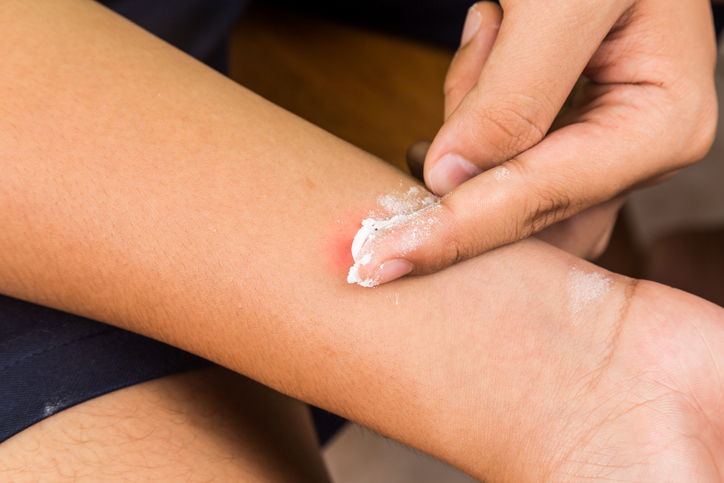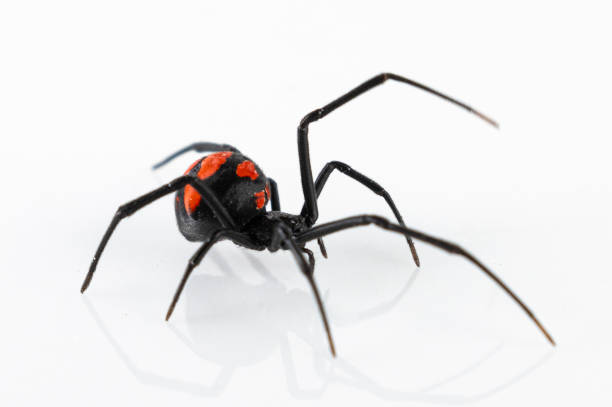
It’s that time of the year…are bug bites bugging you?
Some bug bites and stings, like those from fire ants, wasps, hornets, and bees, are painful. Some can also spread illnesses, such as Lyme disease (black-legged tick), Rocky Mountain spotted fever (dog or wood tick), and West Nile virus (mosquito). The bug bites of other bugs, such as mosquitoes, mites, and fleas, are itchy and uncomfortable, but usually harmless.
RELATED: How To Make Your Own Bug Spray
Learning to identify a bug bite by how it looks and feels will help you know whether to seek medical attention immediately or treat the skin bump at home. Here’s our list of the top 10 most common bug bites:
Most Common Bug Bites
1. Ticks
Many bugs give us a reason for pause, including poisonous spiders, chiggers, bees and lice. But few get under our skin — quite literally — like the tick. If you enjoy the outdoors, be careful of ticks — they can attach as you brush past grass and plants. Ticks don’t always carry diseases, and most bites are not serious. But they can carry diseases, including Lyme disease and Rocky Mountain spotted fever.
Once a tick latches onto skin, it often moves to the warm, moist armpits and groin — feeding on blood and passing on any disease it carries. A tick bite can also trigger an allergic reaction. If you have a tick, it is important to remove it properly. To prevent tick bites, keep your arms, legs, and head covered when outdoors. Use tick repellent with DEET on skin or clothing, or products with permethrin on clothing. Check for ticks after spending time in grassy or wooded areas.
RELATED: Lyme Disease Often Spotted at Later Stage in Black Patients
2. Lyme Disease
In the U.S., the Western black-legged tick and the deer tick can carry Lyme disease bacteria. Infected ticks usually don’t spread the disease until they’ve been attached for at least 36 hours. The first sign of infection is usually a circular skin rash. Early symptoms may also include fever, headache, and fatigue. Untreated Lyme disease may spread to other parts of the body, including the muscles, joints, heart, and nervous system. Most cases of Lyme disease can be treated successfully with antibiotics.

3. Poisonous Black Widow Spiders
Wood piles and tree stumps — that’s where poisonous female black widows hide. She is long-legged and glossy black, with a distinctive orange, red, or yellow “hourglass” shape on her underside. These spiders are roughly ¼ inch wide and 1.5 inches long, counting their long legs.
Black widow spider bites may cause sharp, shooting pain up the limb, but they can also be painless. Look for one or two red fang marks, redness, tenderness, and a nodule at the bite site. Severe muscle cramps, nausea, vomiting, seizure, and a rise in blood pressure may follow soon after. Get medical care immediately. Anti-venom medicine is available. If possible, bring the spider with you for positive identification.
4. Brown Recluse Spiders Can Be Deadly
Hiding in attics and closets — in Midwestern and South Central states — that’s where you’ll find brown recluse spiders. The spiders range in color from yellowish-tan to dark brown, with darker legs. Their venom is extremely poisonous, and their bite can cause serious wounds and infections. Yet you may not feel their bite.
When the brown recluse bites, it is often painless — then skin reddens, turns white, develops a red “bull’s eye,” blisters, and becomes painful. These bites can be deadly in rare cases. Get medical care immediately. If you can, bring the spider with you for positive identification.
5. Fleas
Fleas are small, wingless, agile insects that live off the blood of their host — and they don’t just bite pets. They dine on people, too.
Some people are very sensitive to flea bites — but scratching can cause a wound or infection. The best solution is to get rid of fleas on pets and in your home. Keep pets out of your bed and be sure to vacuum rugs daily. Spray insecticides on infested areas. Consider using a once-a-month insecticide on your pet.

6. Bee, Wasp, Hornet, Yellow Jacket
When a bee stings, it loses its stinger and dies. But a wasp, hornet, or yellow jacket can inflict multiple stings because it does not lose its stinger. These stings can cause serious reactions in people who are allergic to them.
If you don’t have an allergic reaction, simply remove the stinger, clean the sting site, apply ice, take an oral antihistamine for itching, and take ibuprofen or acetaminophen for pain relief. If you have a severe anaphylactic reaction, lie down and carefully remove the stinger. Use an EpiPen (epinephrine) if you have one. Get immediate medical care.
RELATED: Bed Bugs: 10 Places Where They Hide & How To Stop Them
7. Bedbugs
Their name tells the tale, as these tiny insects tend to hide in bedding. They are often found in hotels, shelters, and apartment complexes — and can hitch a ride into your home aboard luggage, pets, and boxes.
Bedbugs leave itchy, red bites on the skin, usually on the arms or shoulders. More of a nuisance than a health hazard, it is possible to develop an infection from scratching. If you have an allergic skin reaction, use creams with corticosteroids and take oral antihistamines — and see your doctor.
8. Fire Ants
Fire ants look much like ordinary ants — and are found in most of the Southeastern states. They produce large mounds in open areas and are aggressive when disturbed. During an attack, the fire ant latches onto the skin with its jaw, then stings from its abdomen. It may inject venom many times.
The fire ant sting typically causes red hive-like lesions that burn and itch. Painful, pus-filled lesions can also occur. Cold packs, pain relievers, and antihistamines can help relieve the discomfort. A large number of stings may trigger a toxic or severe life-threatening allergic reaction. Get emergency care.

9. Mosquitoes
Mosquitoes aren’t just annoying. Scratching a bite can cause a skin infection. Also, mosquitoes can carry West Nile virus, dengue fever, and other diseases. To protect yourself from mosquitoes, apply insect repellent and cover up when you go outdoors. Use window screens, and get rid of standing water in your yard.
10. Chiggers
Contrary to popular belief, chiggers are not insects; they are arachnids. Specifically, chiggers are the juvenile (or larval) form of a family of mites called Trombiculidae. They only dine on humans in their juvenile form, they later become vegetarians as adults. Their bites are painless, but the lesions are very itchy. Itching usually peaks a day or two after the bite occurs.
After a few days of being attached to the skin, chiggers fall off — leaving itchy red welts. Over-the-counter products can help relieve itching. See your doctor if the skin appears infected or the welts appear to be spreading.








